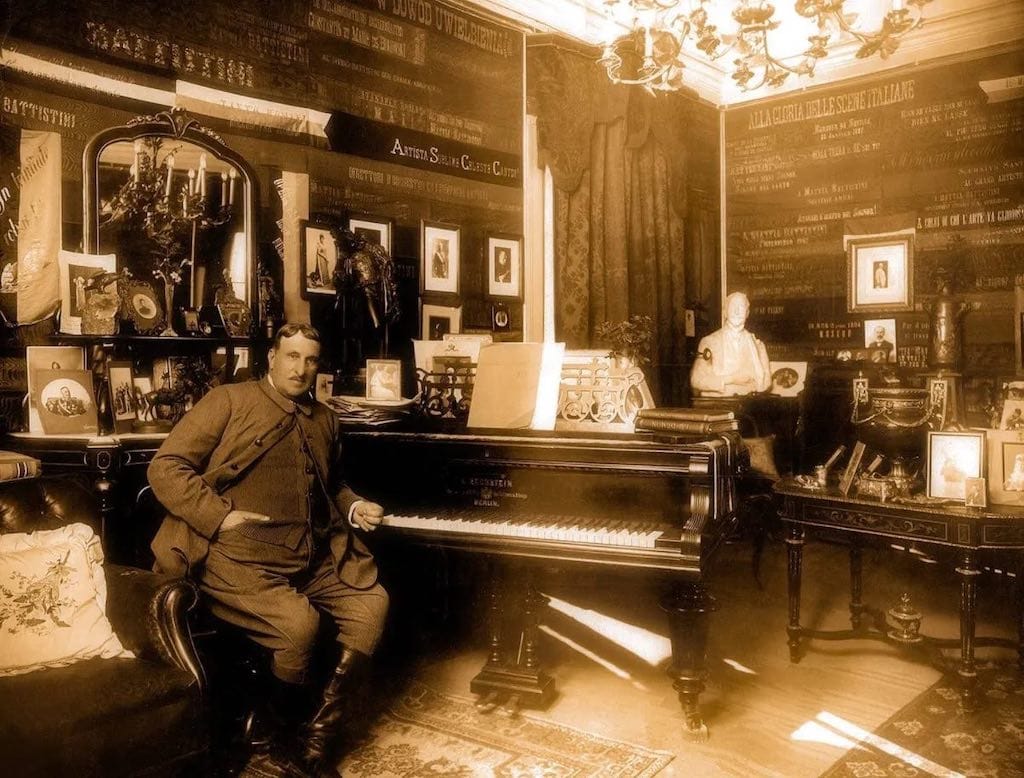The Illustrious Career of Mattia Battistini

Mattia Battistini, the great Italian baritone, was born in Rome on 27th February 1856. After completing his studies, his debut came about as follows: It is 1878. The leading baritone of the Teatro Argentina is indisposed, the opera La Favoritahas been announced and the director is in despair when someone recommends a 22-year-old student. When he is introduced to the prima donna, he sings for her the aria ‘A tanto amor’ and is immediately engaged to play the part that very night. Thus, on 11th December 1878, begins a glorious career that lasted almost 50 years.
In his youth, Battistini went twice to London to sing in I puritani at Covent Garden in 1883, and in Rigoletto and Il barbiere di Siviglia at Drury Lane (Theatre Royal) in 1887. However, his success, like that of his colleagues, was overshadowed by Jean de Reszke.
His major English triumphs came at Covent Garden in 1905 and 1906 when he was heard in Rigoletto, La traviata, Aida and Eugene Onegin. At about the same time he was well established throughout Europe, especially in Russia, as a baritone without rival in the older repertory. Many of his landmark performances took place in Moscow, St. Petersburg and Warsaw where he had a colossal reputation. From 1888 to 1914 he sang in every season in Russia. The Russian aristocracy and the Imperial family treated him as an equal. The Tsar loaded him with honours. He was known as ‘La Gloria D’Italia’.
Though he sang in South America during his early years, he developed a horror of crossing the Atlantic and refused all invitations to the States. He remains one of the few great singers not to have sung at the Met.
Battistini’s vocal powers were almost undimmed by age. After about 16 years, he appeared in concerts at the Queen’s Hall in London in 1922, 1923 and 1924. His unimpaired tone and technique and that he could still sing his favourite arias and songs without transposition astonished his audiences.
He was planning to celebrate the 50th anniversary of his debut by reappearing in the same role in La Favorita when he succumbed to heart failure, a month before the proposed celebration.
He had a voice of extraordinary beauty—the purity, flawless texture and firm production create a thirst for more among listeners. He had fabulous agility and breath control. He had the panache and accomplishment of a virtuoso always ready to hand, with the firm support of a fine Italian school behind him. Several of his records show the incredible delicacy and grace with which he could handle ornaments, say, the beginning of ‘Vieni meco, sol di rose’ from Ernani; the conclusion of ‘Eri tu’ from Un ballo in maschera. Besides, he has also demonstrated what is known as messa di voce, the art of swelling out and dying away on a single note like we have at the end of the aria from Act 1 of Eugene Onegin in which he sustains a long and beautiful messa di voce. The smoothness, ease and fullness of the tone make us think of wine that has mellowed with the years. We have in our collection many of Battistini’s recordings, spanning his long and illustrious career.
The NCPA houses the world-famous Stuart-Liff Collection of 6,000 books, 11,000 LPs and 12,000 CDs on Western classical music. This collection was generously donated to the Centre in 2009 by Vivian Liff, on behalf of George Stuart and himself, as a gesture of their friendship with Chairman Mr. Khushroo N. Suntook, an avid collector and connoisseur himself. The collection is an invaluable source for research by musicologists and students as well as for general music lovers. The library housing the collection is open from 10 am to 5.15 pm on weekdays.
This piece was originally published by the National Centre for the Performing Arts, Mumbai, in the October 2023 issue of ON Stage – their monthly arts magazine.





